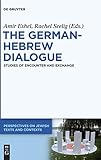The German-Hebrew Dialogue : Studies of Encounter and Exchange / ed. by Rachel Seelig, Amir Eshel.
Material type: TextSeries: Perspectives on Jewish Texts and Contexts ; 6Publisher: Berlin ; Boston : De Gruyter, [2017]Copyright date: ©2018Description: 1 online resource (VI, 263 p.)Content type:
TextSeries: Perspectives on Jewish Texts and Contexts ; 6Publisher: Berlin ; Boston : De Gruyter, [2017]Copyright date: ©2018Description: 1 online resource (VI, 263 p.)Content type: - 9783110471359
- 9783110471601
- 9783110473384
- 909.04924 22/ger
- online - DeGruyter
- Issued also in print.
| Item type | Current library | Call number | URL | Status | Notes | Barcode | |
|---|---|---|---|---|---|---|---|
 eBook
eBook
|
Biblioteca "Angelicum" Pont. Univ. S.Tommaso d'Aquino Nuvola online | online - DeGruyter (Browse shelf(Opens below)) | Online access | Not for loan (Accesso limitato) | Accesso per gli utenti autorizzati / Access for authorized users | (dgr)9783110473384 |
Frontmatter -- Contents -- Editors’ Introduction -- Part One: German-Hebrew Exchange in Modernist Literature -- Not like Cherries, but like Peaches: Mendelssohn and Rosenzweig Translate Yehuda Halevi’s “Ode to Zion” -- The Flowers of Shame: Avraham Ben Yitzhak’s Hebrew-German “Revival” -- Dan Pagis’s Laboratory: Between German and Hebrew -- Stuttering in Verse: Tuvia Rübner and the Art of Self-Translation -- Vera Europa vs. Verus Israel: Modern Jews’ Encounter with Europe in Light of Lea Goldberg’s Encounter with a Poet -- Texts and Objects: The Books of the Schocken Publishing House in the Context of their Time -- איכה /Ach: Lament and Being in Hebrew and German -- Part Two: German-Hebrew Encounters in the Arts Today -- “I write bilingual poetry/in Hebrew and in silence” -- Before the Hebrew Notebook: Kafka’s Words and Gestures in Translation -- Europe Will Be Stunned: Visualization of a Jewish Return -- “In His Image”: On Dani Karavan’s Artwork in Germany -- Mikan ve’eylakh (From this Point Onward), translated by Rachel Seelig -- The Berlin Prize for Hebrew Literature (excerpt from a novel in progress), translated by Rachel Seelig -- About the Authors
restricted access online access with authorization star
http://purl.org/coar/access_right/c_16ec
In the wake of World War II and the Holocaust, it seemed there was no place for German in Israel and no trace of Hebrew in Germany — the two languages and their cultures appeared as divergent as the directions of their scripts. Yet when placed side by side on opposing pages, German and Hebrew converge in the middle. Comprised of essays on literature, history, philosophy, and the visual and performing arts, this volume explores the mutual influence of two linguistic cultures long held as separate or even as diametrically opposed. From Moses Mendelssohn’s arrival in Berlin in 1748 to the recent wave of Israeli migration to Berlin, the essays gathered here shed new light on the painful yet productive relationship between modern German and Hebrew cultures.
Issued also in print.
Mode of access: Internet via World Wide Web.
In English.
Description based on online resource; title from PDF title page (publisher's Web site, viewed 28. Feb 2023)


